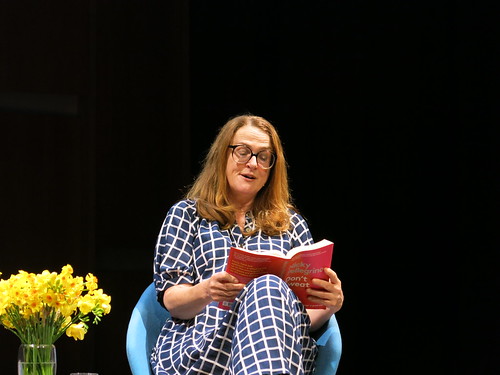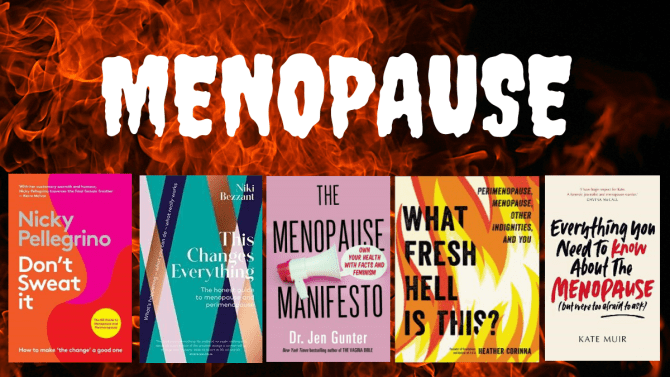I confess I was tempted to do this review in two photos, as my tweet reveals. They give a good sense that this was a pretty funny and joyous "bloody awesome" session .
I am tempted to offer these two photos as my @wordchch Don't Sweat It: Menopause review. Kia ora @nickypellegrino and @MiriamaKamo! ^DR pic.twitter.com/hEM3yUfizX
— Ngā Kete Wānanga o Ōtautahi (@ChristchurchLib) September 4, 2022
Nicky Pellegrino's book Don't sweat it: How to make 'the change' a good one takes on a topic that has long been a bit in the shadows. In it, she explains what menopause is like for her and talks to women like Miriama Kamo and Suzanne Paul who also share their experiences. It's a great combo of medical information and real life stories.
Nicky reckons feminism plays a part in why menopause is starting to get more attention now:
We're not a generation that is used to putting up with anything.
She talks about how at this time of life, appearance changes, fat moves to different places, and you might just go to the pub and find all your friends have the same sensible bob.
There was a certain poignancy in bagging up clothes you won't wear anymore because they don't fit your body or who you are now:
I'm saying Goodbye to the young woman who once wore it.
So what it is it like being perimenopausal? Well, you might not recognise it at first. Periods can be worse, heavier and more erratic. There's a million symptoms and they include brain fog and depression as well as the better-known hot flushes and night sweats. Nicky went to the dentist who noticed her teeth were cracking and tightness in her muscles - due to rage. And that rage is due to everyone being really annoying.
The rage and hating everybody was all because my ovaries had gone haywire.
When Nicky said "I felt like I had imposter syndrome but the person I was trying to be was myself" you could hear such noises of recognition from the crowd. It was a really communal experience.
Loss of confidence and an increase in anxiety were the symptoms that surprised Nicky most. Miriama - who was such a warm and able interviewer - added a lot to this kōrero. She talked about losing confidence in herself as a news reader when going through menopause.
So, are there any good sides to menopause? Some people get an increase in energy. They can wear white trousers (mixed blessing IMHO). Iron levels can get back to normal (I'm hanging out for that one).
Back to the less good aspects. Apparently late perimenopause can give you a dry vagina as a parting gift (Thank late perimenopause, you shouldn't have). Hot flushes mean you might not get a good night's sleep. Your libido might dip. Nicky joked to her husband that she might get "closed for business" tattooed on her bits.
When are you in menopause? 12 months after your last period. This sounds clear, but be aware you might go for 10 months then get it, and the clock starts again.
The discussion moved to HRT. It is much lower risk now than in the past, but some medical experts act as if all women should take it.
This talk was around age and ageing as well as menopause, which makes sense and led to some fruitful areas of conversation. A lot of work needs to be done around menopause and age. Older people are treated in a patronising way, and ageing women (especially in Hollywood and in the media) use appearance medicine. Nicky's not against it, but wants at least a trace of ageing to seep through. "Hugh Grant looks like an Issey Miyake dress" but no-one is putting pressure on him. We need to feel good about being older, to ditch phrases like "mutton dressed as lamb".
Other things that lead to a better experience of ageing? Eating less, good nutrition, lifting weights to strengthen bones, exercise to energise not exhaust. Nicky says wryly:
Not drinking alcohol, and I'm doing a piss poor job of that.
Another good thing to do is "Focus on yourself a bit more". Her mother in law had a rather wonderful piece of life advice:
Every day I do one thing that makes me happy.
When it came time for audience questions, I was first with my hand in the air. "What about when you are going through this and have a young family?" The advice was to let your family be involved, and to be open about how you are feeling and doing. Other questions were:
- How do other nationalities and cultures experience menopause. Japanese people seem to have a better menopause, but hard to know if it is related to soy, genetics, or cultural factors. Nicky and Miriama talked about ruahinetanga - the Māori expression for menopause - and the esteem given to kuia.
- Menopause in the workplace - maybe this should be featured in Health and Safety policies.
- What's a good word to put on forms instead of "retired" (the questioner uses the expression "lady of pleasure"). Ideas proferred - free, self-employed, freelancer
- The last question related to ageism and lack of sexual value "I am very sexy and sexual" said the questioner, but does the world see older people that way? It should!
The overall messages of the session are ones that hold true in so many circumstances. Everyone's lived experience is different. There are good and bad sides to things. Be honest and open with your friends and family. Know yourself. Be kind to yourself. Learn, grow, change.
Photos from the Don't sweat it: Menopause session
READ
WORD Christchurch Festival coverage
Visit our page of WORD Christchurch Festival 2022 coverage and info
WORD Christchurch information
- Visit the WORD Christchurch website
- Follow @wordchch on Twitter
- Like @wordchch on Facebook
- Follow @wordchch on Instagram





Add a comment to: I see white trousers in your future: Don’t sweat it – Menopause: WORD Christchurch 2022